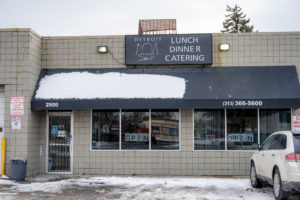Detroit Entrepreneurs Redefine Soul Food

In 2010, Detroit residents Jerome Brown and Samuel Van Buren started a catering business that served homestyle cooking, but with healthful substitutes. “My childhood memories are family gatherings where we all got together around food. But we wanted to make it better for you. The same soulful flavors, just made with lighter options,” says Brown.
So, collard greens are cooked with smoked turkey, not ham hock. Lard is swapped out for vegetable oils. But the meals still pack a flavorful punch. Turns out, others agreed too. While working full-time jobs for nearly ten years, and with the support of their wives, Brown and Van Buren built a robust customer base for their catering and to-go meals through Detroit Soul. In 2015, they went from operating remotely to a brick-and-mortar location where customers could call in and pick up orders. By 2020, they conquered the traditional 50 percent failure rate for small businesses and saw sales soar.
“We wanted to be that neighborhood place, where people could turn to for a good nutritious meal, and not have to go to fast-food establishments, which are everywhere,” says Brown.
To make it more affordable, particularly during the pandemic, they started offering half portions that were priced well under $10, ideal for one person. “We really didn’t want someone to feel like it was out of their reach,” he adds.
But there was one thing that Brown and Van Buren had not been able to do: Provide a place for folks to sit, gather, and have a meal together. They wanted a sit-down restaurant, in addition to their carry-out spot.
“Many people have been asking us, why not have a proper place where I can come and bring my family,” Brown says. “So we started looking at how to finance it, knowing that restaurants are not an easy business.”
 Their first venture had been self-funded for years. But to build out a second location, Detroit Soul needed additional financing. Brown and Van Buren were introduced to a local lender, Detroit Development Fund (DDF), as they looked for a loan.
Their first venture had been self-funded for years. But to build out a second location, Detroit Soul needed additional financing. Brown and Van Buren were introduced to a local lender, Detroit Development Fund (DDF), as they looked for a loan.
As a nonprofit organization and CDFI, DDF was intrigued, but cautious of making another restaurant investment given the number of other restaurants in its portfolio and the challenges facing the food service industry with the pandemic. In addition, because DDF makes loans of up to $250,000, this one was erring on the larger size.
Instead of trying to go it alone, they found like-minded partners with the Michigan Good Food Fund, a statewide collective of partners that provide financing and business assistance to good food enterprises like Detroit Soul. DDF became a Michigan Good Food Fund lender in 2017 and has since made six investments totaling over $750,000 supporting mission-aligned companies that are increasing healthy food access and sparking economic development.
To help de-risk the investment, DDF partnered with Michigan Good Food Fund partner, Fair Food Network, who contributed $50,000 from its Fair Food Fund Collateral Initiative. In fact, it was during the pandemic when many small businesses, especially those led by Black and Brown entrepreneurs, were at risk of being washed away, that Fair Food Network launched the Collateral Initiative as a credit enhancement tool to help de-risk investments for other business lenders like DDF.
With this additional collateral in place, DDF was able to fund the entire expansion loan, which closed in July 2021. “Had it not been for the Michigan Good Food Fund partners and the Collateral Initiative this deal may have been much harder for us to pull together,” says Angelia Sharp, a senior loan officer at DDF, and a patron at Detroit Soul.
But the support was more than just funds to live out their dream of a dine-in restaurant, Brown says. “It’s been nothing but hands-on support. If I have a question pertaining to the business, I have someone to turn to for advice.”
Follow-on business assistance is part of the Collateral Initiative to further support the success of the business. Following the loan, Fair Food Network is helping the duo with other business needs, such as marketing and building out a robust website too.
Even with the experience of a corporate career, Brown and VanBuren joke that navigating all the regulations in the food industry have been mind boggling. They got their first taste of forms, paperwork, and compliance regs when the two scoped out a kitchen for Detroit Soul. Brown says, “I remember spending a full 8-hour day going from city office to city office, asking why I had been charged certain fees and what were all the inspections I needed to be in business. There needs to be a roadmap for these kinds of things. I persevered, but many would have given up.”
 That’s why one needs allies and mentors, he says. “Having resources like DDF, the District Business Liaisons, Accounting Aid Society, Osborne Business Association, and TechTown, this creates a hub for entrepreneurs in the city and has been a refuge for businesses like ours. Going out and getting a loan from any lender is not impossible. But a collective like Michigan Good Food Fund that wants you to succeed, and makes sure you are prepared for what’s ahead, that’s harder to find.”
That’s why one needs allies and mentors, he says. “Having resources like DDF, the District Business Liaisons, Accounting Aid Society, Osborne Business Association, and TechTown, this creates a hub for entrepreneurs in the city and has been a refuge for businesses like ours. Going out and getting a loan from any lender is not impossible. But a collective like Michigan Good Food Fund that wants you to succeed, and makes sure you are prepared for what’s ahead, that’s harder to find.”
After over 20 years of working in the banking industry, Sharp came to DDF, excited by its mission, its desire to help entrepreneurs like Brown and VanBuren, and its willingness to look at deals that a bank may pass on, she says. “This is more than just about the money. Everybody has a dream, and I as a lender want to believe in their plan, and support it as much as possible, to ensure that dream happens.”
In alignment with the Michigan Good Food Fund’s impact areas, Detroit Soul is more than simply a place to get food: “They’re creating jobs here in the local community. They’re working with local food providers to get fresh foods. They’re making foods healthier, encouraging customers to pay attention to their well-being. And they’re genuinely good-hearted people, working hard,” she says.
Now with funding secured and business support at their disposal, Brown and Van Buren expect to open their second location this fall and hope to repeat the success of Detroit Soul once again.
Sharp, as a local Detroit resident, is excited too: “The food is good, real good, I can vouch for that,” she says, smiling.
Fair Food Network is a founding partner of the Michigan Good Food Fund, a statewide collective of partners working together to improve health and economic opportunity by investing in local food entrepreneurs. In addition to serving as the fund’s administrator, Fair Food Network also leads technical assistance and marketing, and its impact investing arm, Fair Food Fund, serves as a lender bringing equity and near-equity capital products. In response to the economic crisis stimulated by the COVID pandemic, Fair Food Fund launched a Collateral Initiative as a credit enhancement tool offered to other business lenders with the goal to catalyze investments that otherwise might not be possible. As a national fund that works locally, the Collateral Initiative is available to lenders in Michigan and the Northeastern United States. Learn more about Fair Food Fund.







